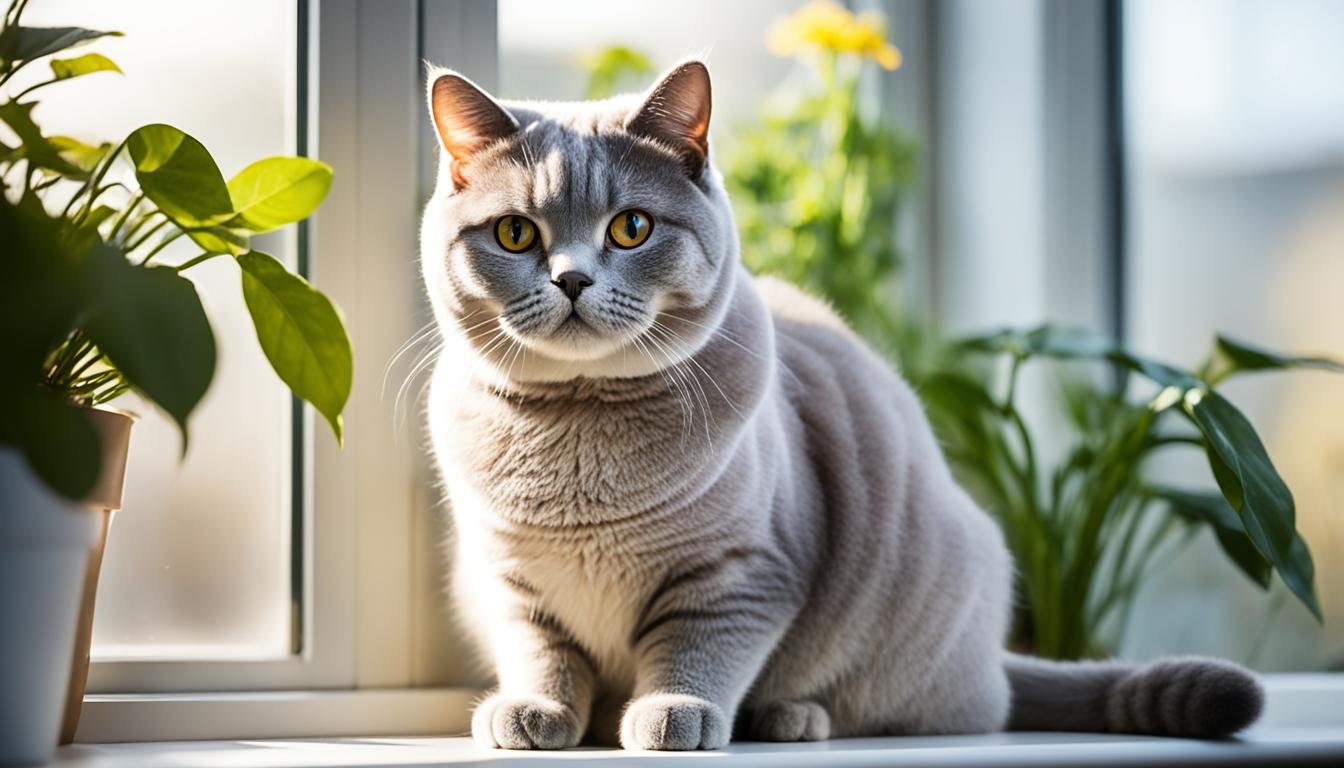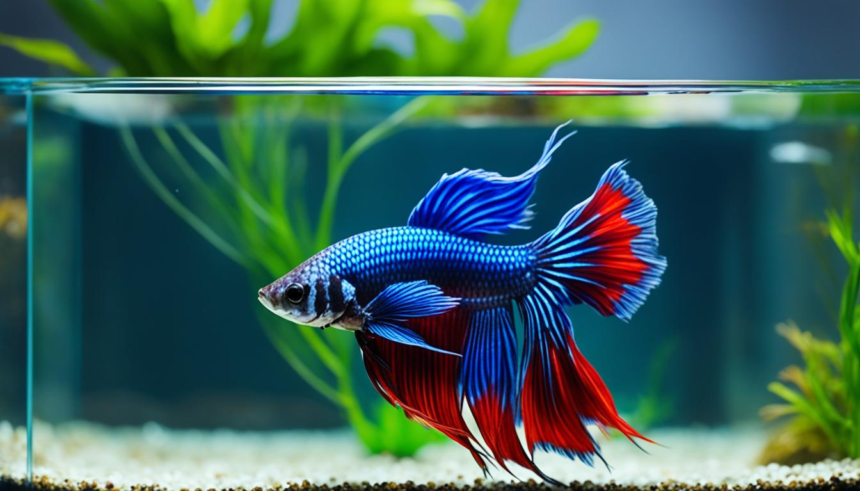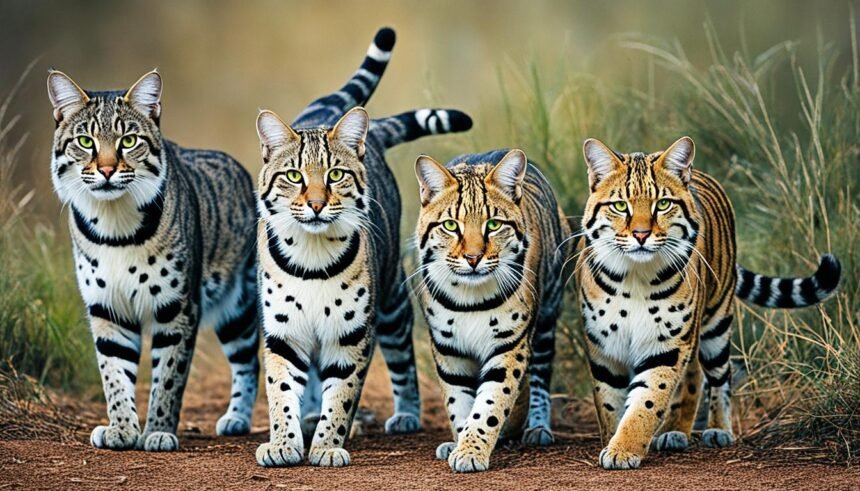British Shorthair cats, with their plush coats and amiable expressions, have captivated the hearts of feline aficionados around the world. Whether it’s their affectionate cat personality or their reputation as the teddy bears of the cat world, these cuddly companions make outstanding pets for a multitude of households. The British Shorthair personality is a meld of autonomy and sociability, a balance that caters to many preferences in pet ownership.
Renowned for being one of the most good-natured breeds, they uphold the felicity of feline friendship with poise and charm. Their easy-going nature paired with a typically gentle demeanor allows them to integrate into the family dynamic seamlessly, affirming their status as excellent companions. As we commence this journey through the lives and loves of British Shorthair cats, we will discover exactly why these teddy-like felines have become one of the most cherished choices for good pets.
Understanding the British Shorthair’s Charming Personality
The British Shorthair stands out in the feline world for its charming personality and endearing temperament. Owners of this cat breed often remark on their calm nature that seamlessly fits into a range of domestic environments, making them a beloved choice for those who appreciate low-maintenance companions. Let’s delve into the traits that make these cats such a pleasure to have around.
British Shorthairs are known for their affectionate behavior that doesn’t veer into clinginess. This makes them perfect for families, singles, and especially for those leading a busy lifestyle. Their ability to maintain a serene composure underlines their suitability for households with children and other pets, fostering a harmonious home.
| Personality Trait | Impact on Lifestyle |
|---|---|
| Calm Demeanor | Ideal for a tranquil household, causing minimal disruption |
| Low-Maintenance Needs | Perfect for owners with busy schedules or those who prefer less demanding pets |
| Affectionate Yet Independent | Provides companionship without the need for constant attention |
| Adaptable | Easily adjusts to various living situations, including apartments and large homes |
| Good with Other Pets | Makes it easier to integrate into a home with existing animals |
Bear in mind that despite their laid-back nature, British Shorthairs do enjoy playtime and interaction. The key to a happy coexistence with this breed is understanding and respecting their preference for balance—between being social and enjoying solitary moments.
In conclusion, it’s the British Shorthair’s capacity to blend affection with self-sufficiency that truly defines their charming personality. Whether you are a seasoned cat owner or considering your first feline friend, the British Shorthair is a breed that promises to enrich your life with their placid temperament and heartwarming presence.
Historical Journey of the British Shorthair Breed
Tracing the history of the British Shorthair, we uncover a tapestry woven with the threads of time that establish this feline as one of the oldest recognized cat breeds in the world. From its ancient lineage to its triumphant showcase in the heart of London, the British Shorthair’s legacy is rich with cultural and historical significance.
The Origin: From Street to Sweet
The genesis of the British Shorthair points to the Roman occupation of the British Isles, where these robust cats first emigrated as street-dwelling mousers. Through years of natural selection and human influence, these valiant survivors of the streets evolved into the sweet-natured and comely pets we adore today.
The First Cat Show: A British Shorthair’s Milestone
The breed’s regal status was solidified in 1871 at the famed cat show held at Crystal Palace, London. This event, celebrated as the first organized cat show, provided a platform that propelled the British Shorthair to new heights of acclaim, highlighting the breed’s diverse array of coat colors and sterling disposition.
British Shorthairs through the Ages: An Ancient Breed
Renowned for its stoic nature and plush coat, the British Shorthair has transcended its initial utilitarian role to become an iconic symbol of British feline heritage. Its journey over the centuries is a testament to the breed’s resilience and adaptability, securing its place as an endearing companion throughout the ages.
Characteristics of the British Shorthair Breed Profile
The quintessential British Shorthair breed is adorned with a distinctive set of physical attributes that solidify its place in the feline world. This large cat, with its robust build, offers a delightful mix of brawn and beauty. A captivating feature of the British Shorthair breed profile is their plush, thick coat, touched with a texture as soft as velvet, making them endlessly pettable.
The breed’s round eyes notably enhance their enigmatic expression, capturing the hearts of cat enthusiasts globally. Known to be a medium to large size cat, the British Shorthair’s muscular physique and substantial bone structure contribute to their teddy bear-like stature. While the coat is indeed dense, pet owners find solace in the fact that it requires minimal grooming while maintaining its luxurious appeal, with only moderate shedding.
| Characteristic | Description |
|---|---|
| Size | Medium to Large |
| Coat Texture | Plush, Thick, Dense Coat |
| Coat Color | Variety including British Blue |
| Eyes | Large, Round |
| Physique | Muscular Build |
| Grooming Needs | Regular grooming; Minimal shedding |
With every glance, the features of the British Shorthair breed draw a picture of a feline exemplar – regal, and yet wholly approachable. The allure lies not only in aesthetics but in their serene demeanor that accompanies their plush, thick coats, and soulful round eyes. This is a breed that redefines the term ‘large cat’, showcasing that bigness can indeed be coupled with a gentle, inviting nature.
British Shorthair Cats in the Family: Kid and Pet Compatibility
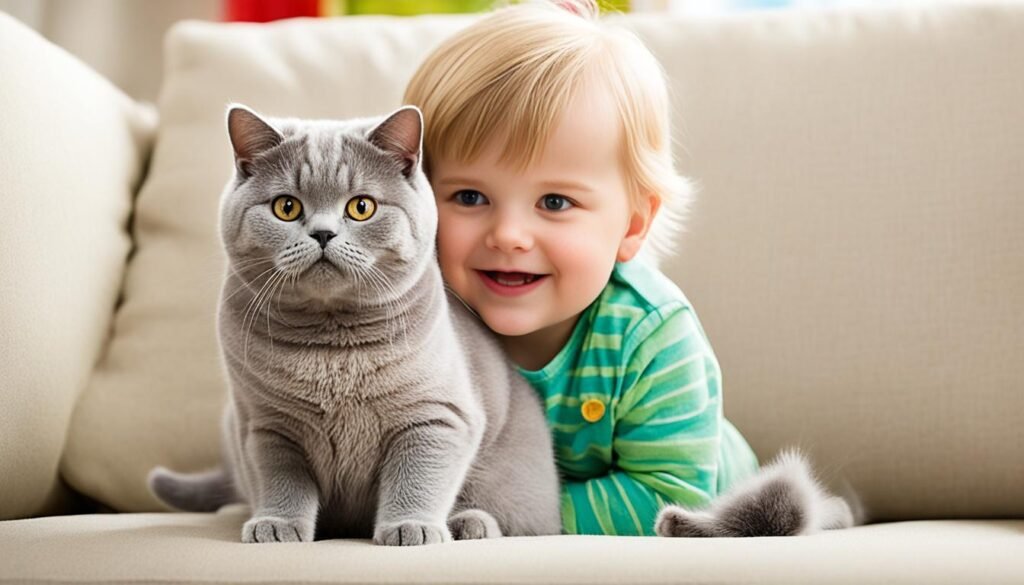
When considering a new pet, especially in a home with youngsters and other animals, it is crucial to ensure that the incoming companion will meld seamlessly into the family fabric. British Shorthair cats are excellent candidates due to their remarkable ability to fit into the hustle and bustle of family life, championing both kid and pet compatibility with their gentle demeanor.
Social Dynamics with Children and Other Pets
Known for being particularly affectionate and patient, British Shorthairs often establish steadfast bonds with children, providing a furry friend for playtimes and quiet moments alike. For those with concerns about how this breed interacts with other pets, rest assured that these cats typically display a non-confrontational and adaptable attitude, making them ideal cohabitants with other four-legged members of the family.
Understanding the Social Needs of British Shorthairs
To truly thrive, British Shorthair cats need an environment that satisfies their modest social needs. While they do enjoy the occasional cuddle and playtime, they are not overly needy and value their independence. Ensuring a balance between shared family activities and opportunities for the cat to have some solo time is key to a harmonious home. This family-friendly breed is content with simply being in the presence of their human counterparts, making them suitable companions for homes where a mix of interaction and personal space is appreciated.
A careful blend of affection, respect for their autonomy, and an understanding of their social cues goes a long way in fortifying the relationship between British Shorthairs and their human family members, creating a peaceful and enriching emplacement for themselves in the heart of the home.
Caring for Your British Shorthair: Grooming and Brushing Tips
Owners of British Shorthair cats can rejoice in the fact that their beloved pets are low maintenance, especially when it comes to grooming. Despite their dense coat, these cats manage to shed less than many other breeds, owing to the nature of their fur. However, to keep their coat in good health and appearance, a consistent British Shorthair care routine that includes grooming and brushing tips is advisable.
A weekly brushing is typically adequate to maintain the lush texture and sheen of their coats. This regular upkeep helps manage dirt, spread natural oils throughout the coat, and reduce the formation of hairballs—a common annoyance in felines. Here’s a simple guide to ensure your British Shorthair’s grooming routine is as effective and enjoyable as possible:
- Select the Right Brush: A brush with medium to soft bristles or a stainless-steel comb works well to detangle and collect loose hair without irritating the skin.
- Brushing Technique: Gently brush in the direction of the fur growth, starting from the head and moving towards the tail. This prevents any discomfort and makes the experience pleasant for your cat.
- Fur Inspection: While brushing, keep an eye out for any signs of skin irritation or unusual hair loss, which could merit a visit to the vet.
- Positive Reinforcement: Use treats and affection to reinforce positive associations with brushing time. This ensures that grooming remains a bonding experience.
The table below compares the grooming needs of a British Shorthair to those of a high-maintenance cat breed, highlighting the ease of caring for your British Shorthair.
| Breed | Brushing Frequency | Grooming Needs |
|---|---|---|
| British Shorthair | Once a week | Low: regular brushing suffices. |
| Persian | Daily | High: Requires extensive grooming. |
Remember that grooming should be more than just a beauty routine; it is a critical part of pet care that enhances the overall well-being of your British Shorthair. Not only does it keep their dense coat in prime condition, but it also affords you the opportunity to check for any potential health issues. This low-maintenance aspect is part of what makes British Shorthairs such a cherished breed among cat enthusiasts.
Are British Shorthair cats Good Pets? Analyzing the Breed’s Affectionate Nature
When considering British Shorthair cats as pets, one can’t help but be charmed by their well-known friendly demeanor. Behind their plush coats and dignified stance lies a warm and affectionate heart, making them a cherished member of any household. These felines display a pleasant blend of independence and loyalty—eager to show their affection without being overly insistent.
The Cuddly Personality of British Shorthairs
Despite what their stout build and composed expressions might suggest, British Shorthairs possess a surprisingly cuddly personality. They cherish the moments of calm interaction with their human counterparts, whether it’s a gentle stroke or a quiet nap in a shared space. Their plush coats and sturdy build only add to the snuggle factor, as they can often be found fitting themselves into the laps of their owners for a cozy nap.
Can British Shorthairs Make Affectionate Companions?
British Shorthairs are not just pets; they’re affectionate companions. With their serene approach to life and occasional playful outburst, they are ideal for someone seeking a furry friend that provides both independence and intimacy. This breed may maintain a regal air, but don’t let that fool you—they’re well known for their ability to form enduring bonds with their owners, making them a popular breed for those looking to add a loving presence to their home.
Many cat fanciers are drawn to the British Shorthair’s affectionate nature, finding their companionship to be as rewarding as it is effortless. Whether resting quietly beside you or actively seeking out your touch, these cats know how to express their affection in ways that resonate with those who cherish them.
Health and Wellness: Common Health Issues for British Shorthairs
British Shorthairs are cherished for their robust health, but as with any breed, they may encounter certain common health issues. Understanding these medical concerns and the importance of genetic screening can help owners keep their majestic felines in optimal condition.
Managing Genetic Conditions in British Shorthairs
Two of the more significant genetic conditions encountered in British Shorthairs are hypertrophic cardiomyopathy (HCM) and polycystic kidney disease (PKD). HCM, which is the most common form of heart disease in cats, causes the heart muscle to thicken, potentially leading to severe health problems. PKD, on the other hand, is characterized by the presence of multiple cysts in the kidneys, which can impair their function over time.
Regular health screenings and echocardiograms by veterinarians specializing in feline health can identify these conditions in their early stages. With early detection, interventions and treatments can be administered to manage these conditions, potentially extending the quality and longevity of the life of a British Shorthair.
Preventative Care for a Healthy British Shorthair
Preventative care plays a pivotal role in ensuring that British Shorthairs lead a healthy and fulfilling life. Establishing a regime of regular veterinary check-ups and tailoring a diet specific to the needs of your feline friend are foundation stones of preventative health management.
| Aspect of Care | Description | Benefits |
|---|---|---|
| Regular Vet Check-ups | Annual or bi-annual visits for wellness exams, vaccinations, and screenings. | Early detection of issues, updated vaccinations, and professional health advice. |
| Proper Diet | High-quality feline-specific food with measured feeding to maintain an optimal weight. | Support kidney health, maintain healthy weight, and promote overall well-being. |
| Dental Care | Regular dental assessments and cleanings to prevent periodontal disease. | Prevent tooth loss, bad breath, and related systemic health issues. |
Moreover, a proactive approach to life stage-appropriate nutrition and weight management can drastically reduce the risk of other common health concerns, such as obesity and its related complications. Remember, a healthy cat is a happy companion.
Exercise and Play: Keeping Your British Shorthair Active
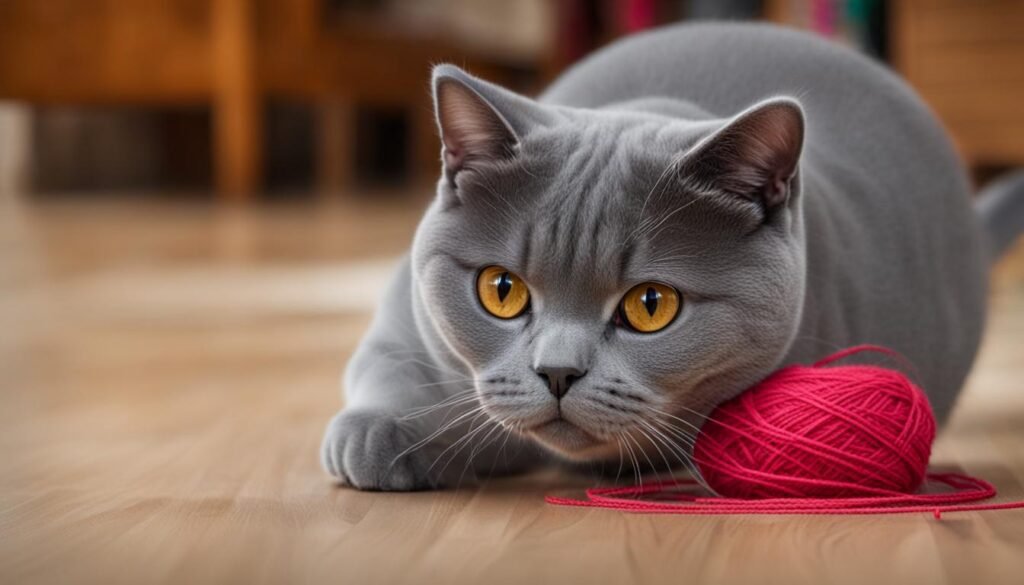
Maintaining an active lifestyle is crucial for the health and happiness of British Shorthair cats. Known for their calm demeanor, British Shorthairs may show a tendency to put on weight without proper exercise and play. To keep your British Shorthair active, it’s important to engage with them in playful activities and provide stimulating toys that promote movement and physical activity.
Interactive toys are excellent for keeping your British Shorthair entertained and on their paws. From laser pointers to feather wands, these tools can help your feline friend get the much-needed exercise to maintain a healthy weight. Also, integrating cat trees into your home provides a combination of exercise and exploration opportunities, allowing your British Shorthair to climb and scratch to their heart’s content.
| Exercise Option | Description | Benefits |
|---|---|---|
| Interactive Toys | Toys that motivate cats to chase, pounce, and leap. | Encourages physical activity and engages natural hunting instincts. |
| Cat Trees | Multi-level structures with platforms and scratching posts. | Allows climbing and provides a dedicated area for scratching. |
| Treat Puzzles | Toys that hide treats and require problem-solving to access. | Stimulates the mind while promoting physical exertion. |
| Laser Pointers | A small laser beam to chase across floors and walls. | Encourages spontaneous bursts of speed and agility. |
It’s vital to incorporate play into your British Shorthair’s routine to avoid boredom and support their well-being. Daily play sessions not only keep your cat active but also strengthen your bond. Remember, a mix of activities will keep their interest peaked and provide a well-rounded exercise regimen to combat their tendency to put on weight.
The British Shorthair’s Adaptability to Living Spaces
Renowned for their robust temperaments and pliability, British Shorthairs exhibit unparalleled adaptability when it comes to their living conditions. Whether nestled within the cozy confines of an apartment or perched in the expansive luxury of a suburban home, these felines flawlessly acclimate, making them ideal indoor pets for a variety of living spaces. Ensuring contentment for a British Shorthair necessitates shaping an environment that is both feline-friendly and conducive to their well-being.
Why It’s Best to Keep British Shorthairs Indoors
Often celebrated as one of the most adaptable cat breeds, the British Shorthair thrives in the safety and tranquility of an indoor environment. With their propensity for comfort and calm, indoor living spaces offer the perfect habitat for these cats to flourish without the risks associated with the outdoors. Predators, traffic, and inclement weather are no concern for British Shorthairs contentedly petted in their serene indoor retreats, where the promise of a long, healthy life is just within their paws’ reach.
Creating a Feline-Friendly Home Environment
Integrating cat-friendly elements into a British Shorthair’s environment is tantamount to feline bliss. A home that is equipped with climbing shelves, scratch posts, and cozy nooks not only encourages natural behaviors but also provides endless entertainment for these curious creatures. Ensuring that a variety of textures and interactive toys are available bolsters a British Shorthair’s physical and mental health—an essential aspect for any indoor pet.
Beyond the basics, cat owners should consider more sophisticated additions to the feline-friendly home:
| Feature | Benefits | Considerations |
|---|---|---|
| Window Perches | Allow cats to observe the outdoors safely | Ensure stability and access to sunlight |
| Interactive Feeders | Stimulate the mind and slow down eating | Select difficulty levels appropriate for your cat |
| Varied Sleeping Areas | Provide comfort and warmth for relaxation | Offer different textures and privacy levels |
| Vertical Space | Encourages climbing and exploration | Use sturdy installations to prevent accidents |
Fostering a cat-friendly abode for your British Shorthair ensures not just their adaptability but also their contentment and thriving disposition as an integral member of your household.
British Shorthair Breeders: Choosing the Right Kitten for You
Embarking on the journey of finding a perfect feline companion starts with identifying esteemed British Shorthair breeders. It is crucial for prospective cat owners to research breeders who invest wholeheartedly in the welfare and upbringing of their young kittens. The right breeder should offer more than just a pedigree; they must ensure the health, well-being, and social aptitude of their cats.
When choosing a kitten, it is not just about the allure of playful antics and plush coats. Instead, it’s about finding a connection and an addition to your home that blends seamlessly into your lifestyle. Before you make a choice, it’s beneficial to observe the kittens’ behavior and interaction with their littermates and humans. This can provide insight into their temperament and suitability for your family dynamic.
- Investigate the breeder’s reputation and history
- Ask about health screenings and genetic testing
- Consider the temperament that suits your home
- Ensure kittens are properly vaccinated and dewormed
Exceptional breeders will prioritize transparency, allowing potential owners to visit and witness first-hand the environments where the kittens are raised. Additionally, a discussion with the breeder about the kitten’s lineage, parental temperament, and the breeder’s long-term support can influence your decision when selecting your pedigreed breed companion.
Ultimately, the allure of a British Shorthair kitten lies in its combination of majestic appearance and amiable nature. It’s a decision that steps beyond aesthetics, delving into the realms of compatibility and lifelong companionship. By aligning with a breeder that meets and exceeds ethical standards, you embark on a rewarding relationship both with the breeder and your future feline family member.
Maintaining a Healthy Diet: British Shorthair Feeding Guidelines
A balanced diet is fundamental for British Shorthair cats to live a long, healthy life. Given their tendency to gain weight, it’s crucial that pet owners implement British Shorthair feeding guidelines that promote a healthy diet and prevent obesity. With a focus on portion control and nutritional value, these guidelines will ensure your British Shorthair maintains an ideal weight and receives all the necessary nutrients for optimal health.
Controlling Tendency to Put on Weight
British Shorthairs may possess a laid-back nature, which, combined with a predisposition for weight gain, necessitates a carefully managed diet. Measured meals, rather than free feeding, are suggested to prevent overeating. Keeping a consistent feeding schedule and providing the appropriate quantity of food is vital in controlling weight. Using specialized cat food that is formulated for indoor cats can also benefit those with limited physical activity.
Measured Meals and Nutritional Needs of British Shorthairs
Nutritional needs for British Shorthairs can vary based on age, activity level, and health. It’s important to measure out meals and feed a high-quality diet tailored to your cat’s specific needs. Cats require a balance of protein, fats, and carbohydrates, along with essential vitamins and minerals. Consultation with a veterinarian can guide you towards the correct meal portions and frequency.
| Life Stage | Protein | Fat | Carbohydrates | Calories per Day |
|---|---|---|---|---|
| Kitten | High | Moderate | Low | 200 – 250 |
| Adult | Moderate | Low to Moderate | Low | 150 – 200 |
| Senior | Lower | Low | Low | 120 – 150 |
”’
Conclusion
The allure of British Shorthair cats extends far beyond their plush coats and endearing round eyes. These felines have earned their reputation as a popular pedigree cat not simply through their striking appearance, but also due to their deeply affectionate nature and compatibility as household pets. Throughout their life stages, from playful kittens to dignified senior cats, their amenable disposition remains consistent, making them a worthy companion for individuals and families alike.
Integral to the harmonious integration of a British Shorthair into your family is the understanding of cat care that caters to their unique needs. With a balanced approach to their grooming, exercise, and dietary requirements, this breed’s health and wellness can be optimized, ensuring they lead a full and happy life. Regular brushing, engaging play sessions, and a measured diet are the keystones of maintaining the British Shorthair’s well-being.
Whether bringing a British Shorthair into a bustling household with children and other pets, or into the calm serenity of a single’s home, these cats gracefully adapt to their surroundings, offering loyalty and companionship. Every cat indeed has its own personality, but the British Shorthair stands out for its peaceful presence and comforting cuddles. Embracing these feline companions into the fold, cat owners can expect to experience the joys and rewards that come with sharing their lives with such a noble and loving breed.
FAQ
Are British Shorthair cats good pets?
Yes, British Shorthair cats are known for being affectionate, cuddly, and good-natured pets. With their teddy-like appearance and gentle disposition, they make excellent household companions.
What is the personality of a British Shorthair like?
British Shorthairs are charming and easy-going. They tend to have a calm and even-tempered personality, making them low-maintenance compared to more demanding breeds. They’re affectionate but not overly clingy, preferring to be close to their owners without being intrusive.
Can you provide a brief history of the British Shorthair breed?
The British Shorthair is an ancient breed that dates back to the Roman occupation of the British Isles. They began as street cats and were later bred for their physical traits. They rose to prominence at the world’s first organized cat show at the Crystal Palace in London in 1871. Through selective breeding, they’ve evolved from their wildcat ancestors into the affectionate and familiar pets we know today.
What are the physical characteristics of the British Shorthair?
The British Shorthair breed has a dense and plush coat, often seen in the classic British blue color, though they come in various other colors as well. They are medium to large-sized cats with a sturdy, muscular build, and have distinctive large round eyes that enhance their expressive faces.
Are British Shorthair cats suitable for families with children and other pets?
Absolutely. British Shorthairs are known for their family-friendly nature and typically exhibit affectionate behavior towards children. They also tend to get along well with other pets due to their sociable yet non-dominant demeanor.
How do you groom and care for a British Shorthair?
British Shorthairs have a dense coat that requires regular brushing to manage shedding, especially during seasonal changes. A weekly brush is generally sufficient. Bathing is rarely needed unless the cat gets particularly dirty. Otherwise, they are considered low-maintenance in terms of grooming.
How affectionate are British Shorthair cats?
British Shorthairs are often quite affectionate with their owners, enjoying moments of quiet companionship and petting. While not as attention-seeking as some other breeds, they are known to be loyal and attached to their human family.
What common health issues should owners be aware of in British Shorthairs?
British Shorthairs are generally healthy, but they can be predisposed to certain genetic issues such as hypertrophic cardiomyopathy and polycystic kidney disease. Regular veterinary check-ups and a proper diet can help manage these risks and maintain good health.
How can I ensure my British Shorthair stays active and doesn’t become overweight?
Incorporating play and exercise into your British Shorthair’s daily routine is crucial. Provide engaging toys, scratching posts, and cat trees to promote activity. Monitoring food intake and providing appropriate portions will also help manage their weight.
Is it better to keep British Shorthairs as indoor pets?
British Shorthairs can adapt well to indoor lifestyles and keeping them indoors can protect them from external dangers. Providing a cat-friendly environment with areas for climbing, playing, and resting will keep them happy and engaged indoors.
How do I select the right British Shorthair kitten from a breeder?
When choosing a British Shorthair kitten, look for reputable breeders who prioritize the breed’s health and temperament. Select a kitten that is well-socialized and seems like a good fit for your home environment and lifestyle.
What are the dietary needs of a British Shorthair?
British Shorthair cats require a balanced diet that’s formulated to meet their specific nutritional needs. Portion control is important to prevent obesity. Consult with a veterinarian to devise a feeding plan that includes quality food appropriate for their age, size, and health condition.

